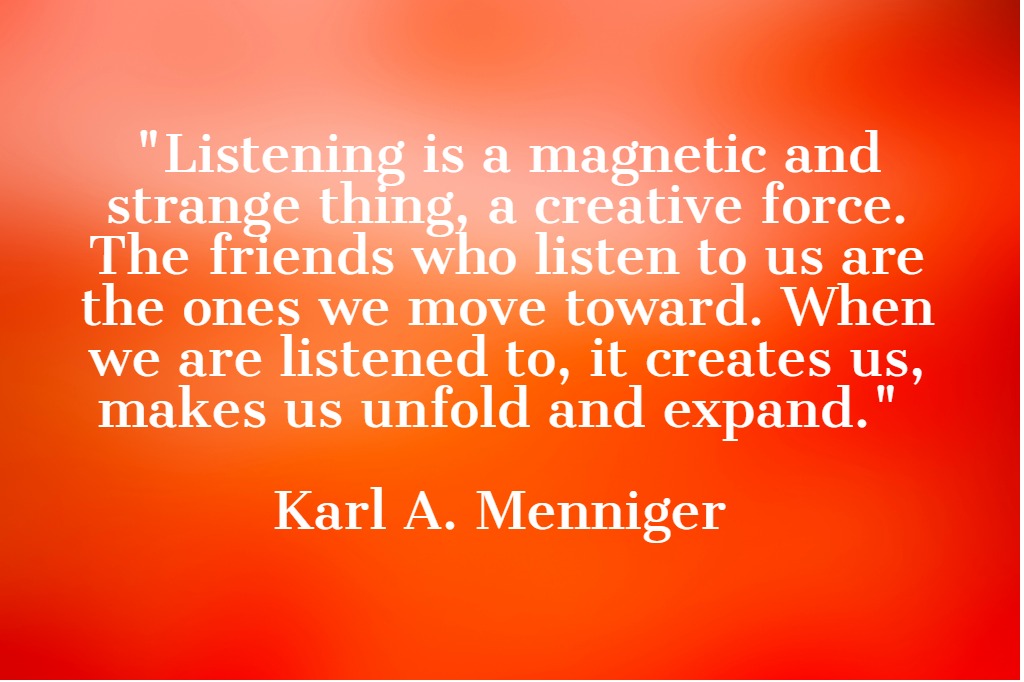Improved Listening Can Be A Positive Career Booster!
Those who excel at listening most certainly have a distinct advantage in any life endeavor. This begs the question, why are we losing the art of listening? In a recent HBR article, “Has Listening Become a Lost Art?, by James Heskett, some of his readers shared these thoughts. “Listening is learning”, “listening is assuming the responsibility and generosity to do something with whatever you hear. After all it is someone’s gift to you.”, “when you feel you are being listened to then it helps you connect to the other person but it also helps you hear yourself.”
I have been working with and providing sales training in the senior living space for many years. I have discovered that the number one issue holding professionals back from progressing and adapting to new information is an inability to listen. On the flip side, those who are better listeners are also far more successful in learning and applying new ideas and skills in their personal lives and they enjoy more success in their careers. Here are some ideas that may help you clear away the top three listening roadblocks and improve your listening and learning.
Gain understanding before responding takes extra time
Today’s environment is so face paced that we can become conditioned to answer questions or respond too quickly and in turn, be less effective and valuable in when it comes to important discussions . Take social media for example.
We live in a culture where we routinely react and respond to a limited number of characters and vague messages in text’s, emails and posts, without even wondering or asking for more information or asking clarifying questions.
In some schools, teachers employ the practice of not calling on students who have their hand up for a long time because they know that their questions or comments were formed when they raised their hand and everything shared after was probably ignored.
One solution is to constantly remind ourselves to recognize that what we are hearing is just the tip of the iceberg and to simply slow down and be more curious and inquisitive.
let’s face it, the potential cost for responding before you understand the real situation can be significant, especially when you consider the damage it could cause to a relationship and the time it could take to remedy a misunderstanding or misguided reaction. It is almost always true that extra time and energy spent to ask some clarifying questions to gain a clearer understanding before we act will always be valuable.
Personal values affect our listening skills.
Our personal values can pose additional challenges to improve our ability to listen. For example, many of us were taught by our parents at an early age, to answer quickly when we were asked a question, weather we understood the question or not. This idea was reinforced in our schooling . If we hesitated to long or heaven forbid, asked for clarification, we ran the risk of being labeled uncooperative, slow or inattentive. An example we can all relate to is when a prospect asks, “Tell me about your community?”. Would you be surprised to know that even well trained sales people routinely answer this question without asking any additional questions. This is referred to “Laundry listing” or less flattering, “Throwing up on the customer”.
It takes more than standard sales training to identify and overcome counterproductive values and their associated behaviors. These values are usually developed when we are young and changing these habits requires some healthy introspection and a desire to improve. In addition to ValueMatch Sales Training, One of my favorite books on this subject is, The Four Agreements, written by Miguel Ruiz, it can be a great place to start.
When You’re in Fear, You Can’t Hear
Shifting from a fear based existence to having a service focus, in my experience, is the number one roadblock to effective listening. It appears when one’s personal motivation is based on a fear of things like survival, loss or success. In Heskett’s article, one reader shared, “Listening to oneself requires sometimes crude and painful honesty that most people feel they can’t afford.”, and it is true that discovering one’s hidden fears can be difficult, it is also true that it can also be enlightening when you begin the process of uncovering your fears and replacing them with more empowering and productive values. Another one of Haskett’s readers shared, “Listening to others works better if you can show empathy and put yourself in the other peoples’ shoes” , which I suggest can only occur when you are able to focus on them instead of yourself.
One of the most important exercises in ValueMatch training, is Value Orientation where attendees have the opportunity to listen to themselves and answer seemingly simple questions about why they do the things they do? Click Here for free copy of the Values Orientation training manual pages and exercise.
In this exercise, attendees are guided to peel the layers of the onion back, on their own values until they reach a point where they can discover if their core motives are fear or service based. Not surprisingly, most discover that they have been operating out of fear for some time. Now, armed with the new information, attendees begin the process of replacing less productive, fear based values with other values based on love and service. One recent attendee proclaimed, “I have always prided myself as being a service oriented person, something I know I learned from my parents.” “I was surprised to discover that somewhere along the line, I had regressed a little to being more focused on myself. Now I can consciously put the important values first and be more attentive to the needs of those I care about”.
“We all have the potential to improve our ability to Listen and in so doing, become more valuable to the people in our the lives we care about and serve. ” William Nowell
Click Here for information about Will’s book, Let’s be Honest, Everybody Lies.
Want to learn more about how to improve listening during the sales process? Check out Will’s recorded Webinar: Talk Less – Sell More
William Nowell has been providing sales consulting and training in the housing industry for more than 25 years. Will is the author of the best-selling book, ValueMatch Selling. and the president of ValueMatchPlus and Peak Performance MS. To reach Will Nowell directly, wnowell@valuematchplus.com or call him directly at (602) 284-0124.
To Read More:
Adam Bryant, Quick and Nimble: Lessons from Leading CEOs on How to Create a Culture of Innovation, Macmillan, 2014.
David DeSteno, The Truth About Trust: How It Determines Success in Life, Love, Learning, and More, Hudson Street Press, 2014.
Edgar H. Schein, Humble Inquiry: The Gentle Art of Asking Instead of Telling Berrett-Koehler Publishers, Inc., 2013.
Ralph G. Nicoles, Leonard A. Stevens, Listening To People








